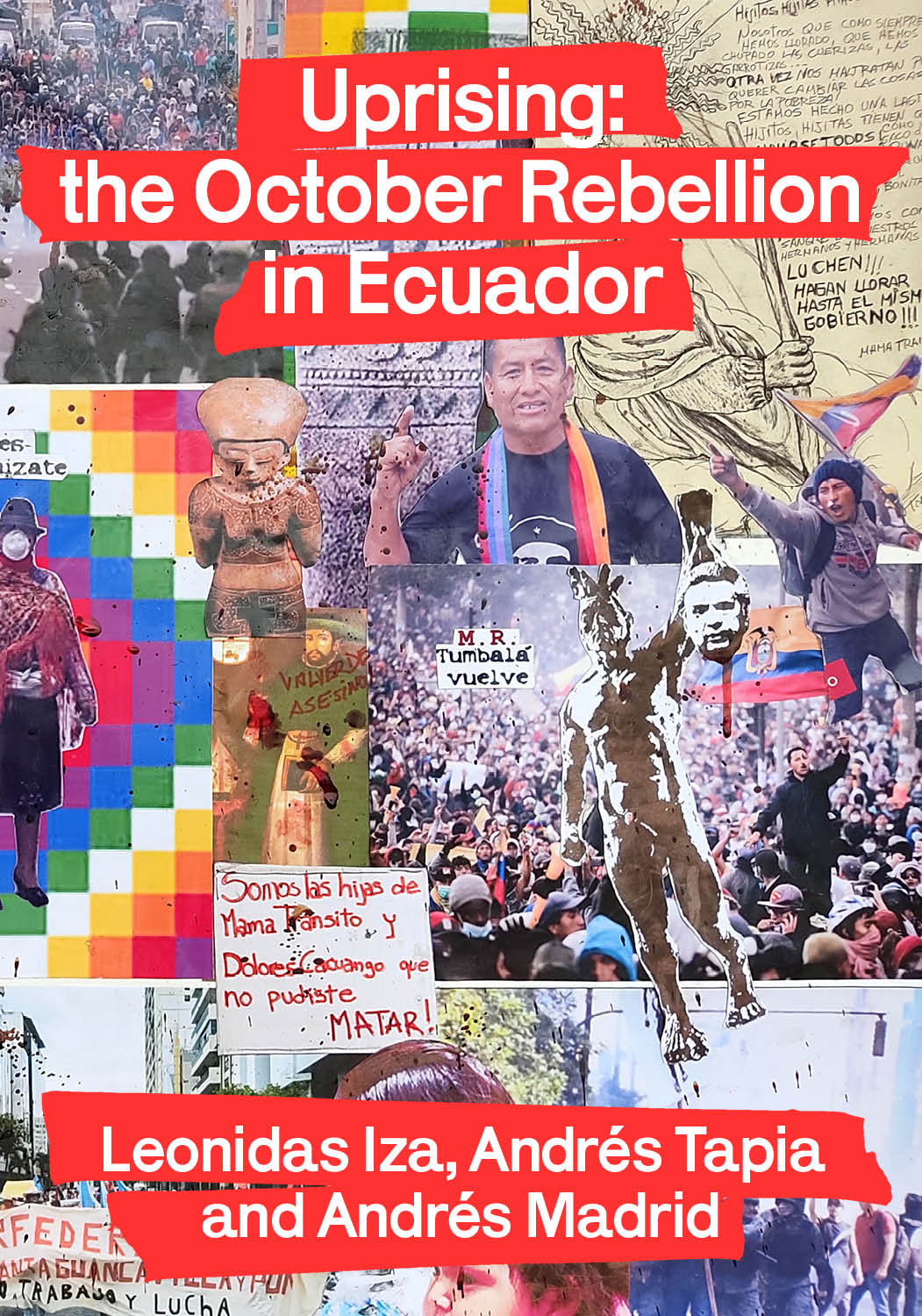ISBN: 978-0-902869-23-3 (print)
e-ISBN 978-0-902869-22-6 (e-book)
RRP: £19, €24, $28 (print)
RRP: £10.99, €15.99, $19.99 (e-book)
350 pages; 178×254 mm.
Includes tables, maps, graphs and 40 photographs.
Publication date: April 2023
About the book
UPRISING is a detailed description and analysis of the Indigenous-led uprising of October 2019 in Ecuador, written by three people deeply involved in the revolt. The lead author, Leonidas Iza, came to national prominence as one of the central leaders of the rebellion. On the final day of the paro, when the movement forced the government of Lenin Moreno to withdraw Decree 883 and accede to live televised talks with the leaders of CONAIE, the main Indigenous umbrella organisation, it was Leonidas Iza who tore apart the arguments of the finance minister in front of the nation, giving him a master class in the implications of neoliberal economics and the government’s deal with the IMF.
About the authors
Leonidas Iza is President of the Confederation of Indigenous Nationalities of Ecuador (CONAIE), and is the best-known of a new generation of Indigenous leaders in Ecuador. He emerged as one of the central leaders of the October uprising, when he was President of the Cotopaxi Indigenous and Campesino Movement.
Andres Tapia is Head of Communications at the Confederation of Indigenous Nationalities of Ecuadorean Amazonia.
Andres Madrid teaches at the Central University of Ecuador. He is the author of In search of the spark on the prairie. The revolutionary subject in the thought of the left intellectuality in Ecuador.
Contents
- Foreword, Michael Löwy
- Prologue, Leonidas Iza, Andrés Tapia, and Andrés Madrid
- Preface: Back to October, Hernán Ouviña
- Introduction
- Imminence: Background, accumulated experience and rupture
- Awakening, determination, struggle and resistance
- Impact: lessons, debates and perspectives
- Epilogue: Our day-to-day October
- Appendix: Platform for the ‘Campaign of Escalating Struggle’
Recommendations
The October 2019 rising in Ecuador was a sign of things to come, as estallidos, or uprisings, erupted later in Chile and Colombia. They represented a “people in movement” – the construction of a new kind of power from below, the merging of new forms of popular resistance with historic expressions of indigenous rebellion, all reflected in the collective voice of rebellion which this remarkable book presents. In the course of those October days, as one speaker puts it, “the everyday became extraordinary”, and a different future beckoned. Mike Gonzales, Emeritus Professor of Latin American Studies, Glasgow University
This book is an account of a semi-revolutionary confrontation, written by one of its key protagonists, Leonidas Iza, who is now arguably the most important Indigenous leader in Latin America, and two of his comrades. It combines a detailed, first-hand account of what happened, with a profound, Marxist analysis of why and how, and what social movements and the ecosocialist left can learn from it. Unmissable! Iain Bruce, journalist and writer, former head of news at teleSUR TV
Through the prism of popular revolt in Ecuador, this crucial book shifts our primary focus away from elections, presidents, and parliamentary figures, and towards indigenous insurrection and the rural-urban insubordination of popular classes. It shows how the experiences of struggle and self-organization are the real breeding ground of indigenous emancipation and socialist possibility, neither of which will be born through legislation on high. The October 2019 eruption in Ecuador deserves careful study by anticapitalists everywhere. This text historicizes that moment, disentangles the complex networks of solidarity underpinning it, and explains it as a fundamental response to Ecuador’s subordinated development within the capitalist world economy and the ongoing displacement of capitalist crises onto the oppressed. Jeffery R. Webber, co-author of “The Impasse of the Latin American Left”.
Published by
Resistance Books, London (resistancebooks.org) and the International Institute for Research and Education, Amsterdam (iire.org)


